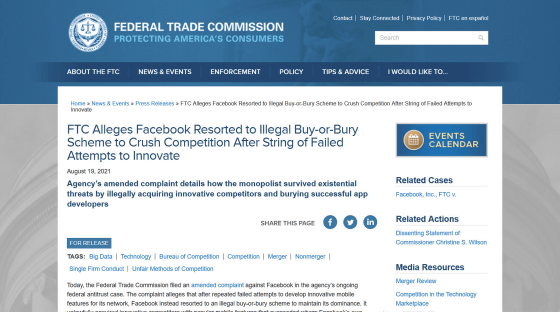The Federal Trade Commission amends and resubmits a dismissed complaint stating that Facebook's acquisition of Instagram and WhatsApp violates antitrust law.

The US
FTC Alleges Facebook Resorted to Illegal Buy-or-Bury Scheme to Crush Competition After String of Failed Attempts to Innovate | Federal Trade Commission
https://www.ftc.gov/news-events/press-releases/2021/08/ftc-alleges-facebook-resorted-illegal-buy-or-bury-scheme-crush

FTC files renewed antitrust complaint against Facebook
https://www.cnbc.com/2021/08/19/ftc-files-new-antitrust-complaint-against-facebook.html
FTC says Facebook has been a monopoly'since at least 2011' in amended antitrust complaints --The Verge
https://www.theverge.com/2021/8/19/22627032/ftc-facebook-amended-antitrust-complaint-monopoly-instagram-whatsapp
FTC: Facebook was bad at business, so it “illegally bought or buried” competition | Ars Technica
https://arstechnica.com/tech-policy/2021/08/facebook-illegally-bought-or-buried-competition-ftc-says-in-refiled-lawsuit/
In recent years, it has advanced the investigation of antitrust violations for the giant IT companies, including Facebook in various countries, antitrust subcommittee of the US House of Representatives Judiciary Committee in July 2020 to open the hearing , Google · CEOs of Amazon, Facebook, and Apple gave testimony. In October, the Japan Fair Trade Commission also announced that it would 'scrutinize Google, Apple, Facebook and Amazon together with the United States and the EU.'
Meanwhile, the FTC in the United States said, 'Facebook's acquisition of Instagram in 2012, WhatsApp acquisition in 2014, and the strict conditions imposed on software developers using the Facebook platform are anti-competitive to strengthen their monopoly in the market. On December 9, 2020, we filed a lawsuit against Facebook on suspicion of antitrust law, demanding that Instagram and WhatsApp be separated from Facebook. However, on June 28, 2021, the Federal District Court for the District of Columbia said, 'The court does not agree with all of Facebook's allegations, but the FTC's complaint is legally inadequate and must be dismissed. I agree with you, 'he dismissed the FTC's complaint.
Facebook's market capitalization surpasses $ 1 trillion for the first time, following the dismissal of allegations of antitrust violations --GIGAZINE

Judge James Bosburg of the District Court for the District of Columbia said, 'The FTC has the necessary requirements to claim antitrust violations: Facebook has exclusive power in the SNS market. We did not provide enough evidence to prove it. ' He then gave the FTC a grace period to amend the complaint.
In response, the FTC resubmitted the complaint to the court, adding data to reinforce Facebook's antitrust violations and supplementing the findings. The revised complaint was submitted by the FTC with 3 votes in favor: 2 votes against, and the vote in favor of Chairman Lina Khan, who has shown a strict stance on the monopoly of giant IT companies, was indispensable. Known as an anti-Amazon pioneer , Kahn was also petitioned by Facebook to withdraw from antitrust investigations, but he did not respond to this petition at the time of writing.
The amended complaint alleges that Facebook's acquisition of Instagram and WhatsApp is a violation of antitrust law, as it was originally. 'Facebook lacked business insight and lacked the technical talent to survive the move to mobile,' said Holly Vedova, deputy director of the FTC Competition. When they failed to compete with other companies and the popularity of their competitors became an existential threat, Facebook illegally bought or buried them. '
Facebook, which has grown as a service for PCs, has fallen behind in the 2010s transition to the mobile Internet and smartphones, FTC claims, and CEO Mark Zuckerberg said, 'Facebook is vulnerable to the mobile space. It seems that he recognized that. However, FTC claims that Facebook lacked the talent to integrate into smartphone-based communications and addressed the threat by acquiring Instagram and WhatsApp, which were successful in the mobile space. This drastically reduced the racing ability of rival companies, leading to the strengthening of monopoly control.
In addition, Facebook encouraged software developers to use the Facebook platform via the API, but eventually changed the API usage policy. The FTC claims that Facebook's potential competitors, app developers, have been eliminated by setting items such as 'do not compete with Facebook' and 'do not promote the growth of rivals' as conditions for access to the Facebook platform. increase. Facebook's strategy of acquiring competitors and eliminating developers is what the FTC calls the 'Buy-or-Bury strategy.'

by www.shopcatalog.com
In the complaint, the FTC calls the market where Facebook resides 'personal social networking services.' Personal social networking services are features that map user connections using a social graph that shows the connections between influential people, and focus on 'contact and dialogue between individuals' rather than disseminating information, and users. FTC claims that they are unique in their ability to find each other.
According to the definition of FTC, LinkedIn, a business-specific SNS that connects with a specific purpose, and Strava, which integrates activity tracking and SNS, are not included in personal social networking services. Also, platforms that share content such as YouTube and TikTok do not meet the definition, and Twitter and Reddit, which are not focused on connecting friends and family, are also excluded.
When the first complaint was dismissed, the judge pointed out that the description of the personal social networking service was ambiguous and did not explicitly include multiple rivals in order to show Facebook's market power. .. In response, FTC added new data, saying, 'Facebook's share of personal social networking services in the United States has exceeded 65% since 2012, at least in 2011. I insist.
Regarding the FTC's resubmission of the complaint, Facebook said on Twitter that 'the court dismissed the complaint and concluded that the allegations were lacking, but the FTC chose to continue this useless proceeding. I'm sorry. ' The FTC's allegation that Facebook violates antitrust law is not justified because the acquisition of Instagram and WhatsApp was judged to be okay in the reviews at the time and the platform policy is also legal. rice field.
It is unfortunate that despite the court's dismissal of the complaint and conclusion that it lacked the basis for a claim, the FTC has chosen to continue this meritless lawsuit.
— Facebook Newsroom (@fbnewsroom) August 19, 2021
Related Posts:
in Note, Posted by log1h_ik






